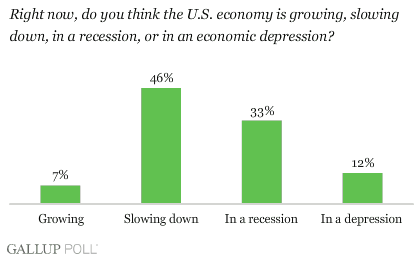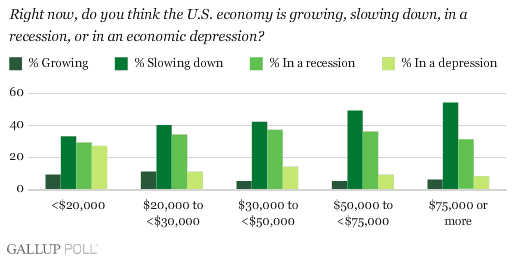PRINCETON, NJ -- While much of the nation was focused on the Super Tuesday elections earlier this week, and Americans were telling pollsters that the condition of the economy was one of their top concerns, the Institute for Supply Management issued a stunning report. Its January index of business activity -- activity outside of the manufacturing sector -- took its biggest plunge in its more than 10-year history. This important measure of current economic activity also turned negative for the first time since March 2003 -- the month the war with Iraq began. Given that the backdrop for this news was the Commerce Department's report last week that the U.S. economy actually lost jobs in January, it should not be surprising that Wall Street took a plunge.
Nor should it shock anyone that 8 in 10 Americans now believe the U.S. economy is experiencing either a slowdown or a recession. However, it may be surprising how many lower-income Americans think the country is not only in a recession but in an economic depression.
Assessing the Current Economy
In a new USA Today/║┌┴¤═° poll, conducted Jan. 30-Feb. 2, 45% of Americans describe the U.S. economy as already being in a recession (33%) or a depression (12%). Another 46% say the economy is currently experiencing an economic slowdown; only 7% say the economy continues to grow.

More Lower-Income Consumers See Recession/Depression
As might be expected, a higher percentage of lower-income than upper-income consumers describe the current economy as being in a recession or a depression. Nearly 6 in 10 consumers making less than $20,000 a year think the U.S. economy is experiencing a recession or a depression, with more than one in four (27%) saying the economy is in a depression. While still a high percentage, only 31% of those making at least $75,000 think the economy is already in a recession and only 8% say it is experiencing a depression.

Defining Recession and Depression
An old saying defines the difference between a recession and an economic depression: A recession takes place when you are unemployed, while a depression takes place when I'm unemployed. Given the relatively good employment levels during recent years and the technical definition of a recession, usually described as two consecutive quarters of negative economic growth, many economists argue that the U.S. economy is not really in a recession -- let alone anything resembling an economic depression.
On the other hand, to many economists, the application of the terms "recession" and "depression" have a much more psychological and emotional connotation. The fact that the U.S. economy has not experienced anything resembling a severe recession in about a quarter century tends to set the bar pretty low as far as economic hardship is concerned. Clearly, many Americans associated with the housing, auto, and manufacturing industries have good reason to think of the economy as in a depression, as do the unemployed and underemployed.
Regardless, the fact that so many Americans feel the country is already in a recession or a depression does not spell good things for consumer spending, business activity, or the future direction of the U.S. economy. Still, even with all the current doom and gloom, many Americans of all income groups remain optimistic about the economy just a year from now: 44% of all Americans, including 45% of those with lower incomes, say they expect the economy to be growing at that time. This suggests that while many Americans seem to feel the current economic downturn could be severe, they also believe it will be mercifully brief.
Survey Methods
Results are based on telephone interviews with 2,020 national adults, aged 18 and older, conducted Jan. 30-Feb. 2, 2008. For results based on the total sample of national adults, one can say with 95% confidence that the maximum margin of sampling error is ┬▒2 percentage points.
Interviews are conducted with respondents on land-line telephones (for respondents with a land-line telephone) and cellular phones (for respondents who are cell-phone only).
In addition to sampling error, question wording and practical difficulties in conducting surveys can introduce error or bias into the findings of public opinion polls.
